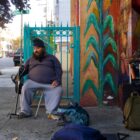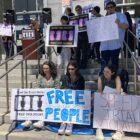The San Francisco Chronicle reported recently that the San Francisco Police Department had delayed for two years the processing of DNA found near Ruby Ordenana, a transgender woman and prostitute who was killed in 2007. In the months after Ordenana’s death, three other transgender women survived assaults in San Francisco. The police have now linked DNA in Ordenana’s case with the attacker of two of the three women. The suspect’s DNA had been in a state databank since 2004.
But attacks on transgender women — particularly on trans women of color — are hardly a local phenomenon, and are sparking discussion of what activists say is an alarming trend far beyond the trans haven of San Francisco.
On Nov. 13, 19-year-old Jorge Steven López Mercado was found beheaded, dismembered, stabbed and burned in Cayey, Puerto Rico. CNN reported that the suspect in the case, Juan Martinez Matos, told the Telemundo TV network he had picked him up the previous night. Martinez Matos claimed he panicked and went into a rage when he discovered that López Mercado, who had been wearing a dress, was male.
Some observers, such as Pedro Julio Serrano, a representative of the National Gay and Lesbian Task Force, described López Mercado as openly gay. Some writers in the transgender blogosphere said the teen should have been recognized as a transgender woman. But advocates in the lesbian, gay, bisexual and transgender community agreed that the killer was acting out of bigotry — what they call transphobia.
Supporters in Puerto Rico, and across the U.S., held nationally coordinated vigils for López Mercado on Nov 22. Several of the vigils, including San Francisco’s, also honored two other youths assaulted in the last month under similar circumstances. Jason Mattison Jr. of Baltimore, was found dead at his aunt’s house, having been raped, gagged and stabbed repeatedly. Jayron Martin of Houston, was beaten by several other teens with a pipe, surviving only when a shotgun-wielding neighbor scared his attackers away.
The vigils overlapped with Transgender Day of Remembrance, observed internationally on Nov. 20. The Transgender Europe Trans Murder Monitoring Project has tallied more than 160 deaths throughout the world this year in violence toward people perceived as transgender. The numbers do not include survived assaults, and researchers said the 160 count is just the tip of the iceberg because many such crimes never get reported.
Many lesbian, gay, bisexual and transgender leaders accuse authorities of looking the other way when youth are at risk of assault, especially youth of color. Mattison and Martin are African-American. Martin had reportedly asked two principals at his school for help after he was threatened with the assault, and even pleaded with the school bus driver for help as he was about to exit at his stop. The driver did nothing, and the group chased and then beat the teen.
Regarding López Mercado’s death, Puerto Rican police investigator Ángel Rodríguez Colón told the Univisión TV network, “These types of people, when they enter this lifestyle and go out into the streets know that this could happen.” Advocates say that Rodríguez Colón is blaming the victim and that he should resign.
Oakland vigil organizer Leah Lakshmi Piepzna-Samarasinha said in a statement that she believes hate crimes legislation and increased police patrols won’t help reduce transphobia and homophobia: “What could’ve actually saved the two young people’s lives are things like free or affordable public transportation, an end to housing and employment discrimination against queer and trans people of color, and the decriminalization of sex work.”
Echoing that approach, Puerto Rican protesters demonstrated in San Juan in the days after López Mercado’s death, calling for increased attention to human rights concerns such as discrimination in the workplace.









